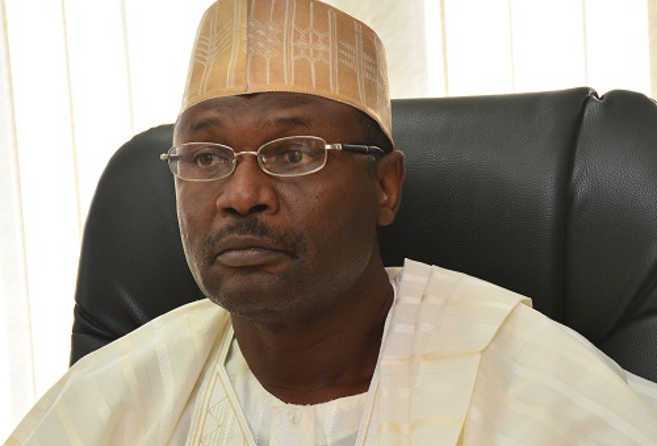The chairman of the Independent National Electoral Commission, Mahmood Yakubu on Saturday explained why the commission under his leadership waited till the early hours of the election day to postpone the elections.
Recall that the commission had earlier fixed Saturday, February 16 for the Presidential and National Assembly elections and March 2nd for the Governorship and State Houses of Assembly elections.
The commission had also at various times reinstated its readiness for the February 16th and March 2nd polls
However, Nigerians woke up to a rude shock on Saturday morning just hours before the opening ofthe polls with news that the commission had postponed the both the presidential and governorship elections by one week.
According to the commission, the elections will now hold on February 23 and March 9 respectively.
However, Nigerians in their numbers condemned the postponement, especially its timing, and have accused the commission of insensitivity, noting that INEC had must apologise for the inconveniences.
At a news conference Saturday afternoon, the embattled chairman said the commission had been involved in large scale operations in preparations for the polls that “it is therefore not unexpected that such a tremendous national mobilisation of men and materials would encounter operational challenges.”
He listed the key challenges to be delays in delivering ballot papers and result sheets, occasioned in part by flight challenges due to bad weather.
He said apart from the logistical challenges, there were attempts to sabotage the commission’s preparations, listing fire outbreaks at INEC facilities that destroyed smart card readers and voter cars. The fire at Anambra was the most serious of all, he said.
Mr Yakubu said despite those setbacks, the commission rapidly recovered by mopping up available card readers elsewhere.
He said if the polls had gone ahead, it would have meant some states starting well ahead of others with the implication of the elections being staggered.
“Faced with these challenges, we initially thought that we only required a maximum of 24 hours to resolve the logistics issues involved and complete our deployment for the election,” he said. “This would mean shifting the elections to commence on Sunday 17th February, 2019. However, given the restriction of movement during elections, that could affect many voters who worship on Sunday. While the commission considering the following Monday, 19th February, 2019 as an option, our ICT department advised us that it would require 5-6 days to configure about 180,000 smart card readers earlier programmed to work only on election day, Saturday, 16th February 2019.”
Speaking further Mahmood said: “There have been delays in delivering ballot papers and result sheets for the elections which are not unusual. However, one must emphasise that all the ballot papers and result sheets were ready before the elections despite the very tight legal timeframe for the nomination of candidates and dealing with the spate of legal challenges that accompany it.
“In this regard, the commission has been sued or joined in over 640 court cases arising from the nomination of candidates. As of today, there are 40 different court orders against the commission on whether to add or drop candidates.
“The net effect of these is that there is usually roughly a one-month window for the commission to print ballot papers and result sheets and either fly or transport them to several destinations until they finally get to each polling unit.
“Unfortunately, in the last one week flights within the country have been adversely affected by bad weather. For instance, three days ago, we were unable to deliver materials to some locations due to bad weather.
“We therefore had to rely on slow-moving long haulage vehicles to locations that can be serviced by air in spite of the fact that we created five zonal airport hubs in Abuja (North Central), Port Harcourt (South South and South East). Kano (North West), Maiduguri and Yale (North-East) and Lagos (South-West) to facilitate the delivery of electoral logistics.
“Apart from these logistical challenges, we also faced what may well be attempts to sabotage our preparations. In a space of two weeks, we had to deal with serious fire incidents in three of our offices in Isiala Ngwa South Local Government Area of Abia State, Qu’an Pan Local Government Area of Plateau State and our Anambra State Office at Awka.
“In all three cases, serious disruptions were occasioned by the fire, further diverting our attention from regular preparations to recovery from the impact of the incidents. In Isiala Ngwa South, hundreds of PVCs were burnt, necessitating the recompiling of the affected cards and reprinting in time to ensure that the affected voters are not disenfranchised. I am glad that all the cards were quickly reprinted and made available for collection by their owners.”
“In Qu’an Pan Local Government Area, our entire office was razed, destroying all the materials prepared for the elections printed register of voters, ballot boxes, voting cubicles and several electricity generating sets. ll Registration Areas and over I00 polling units were affected by the tire. We recovered quickly and have since replaced everything destroyed. In addition, we secured a suitable building from which to conduct the elections.
“Perhaps the most serious was the fire incident in our Anambra State Office at Awka, which destroyed over 4,600 Smart Card Readers being prepared for the elections. These Card Readers take at least six months to procure. Despite this setback, we have practically recovered from this by mopping up every available.


